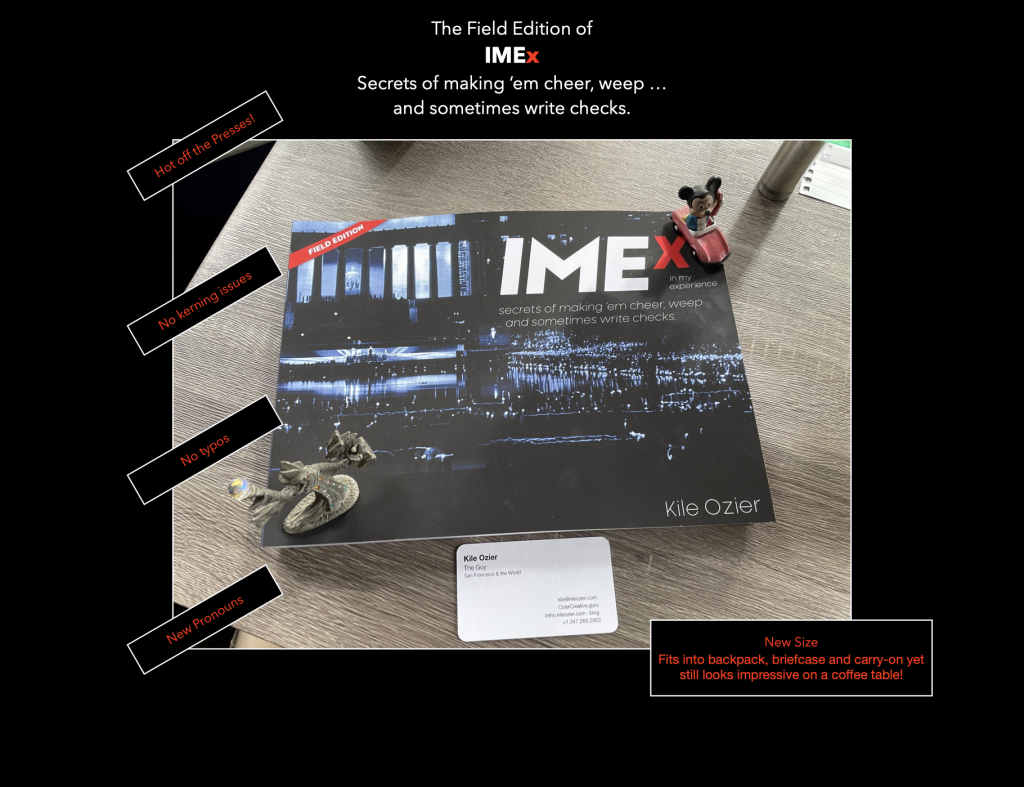Last Summer, I taught a Master Class with the Themed Entertainment Creative Academy;
“Getting the Best from Our Teams –
Giving the Best to Our Audiences.”
For me, it was a great experience; and I sense that the students enjoyed it as much as I did. There was exceptional room for discovery and the sharing & comparing of perspective through the six weeks; enhanced by the fact that this was my first class, post publication of my book.
Prior to this, when I taught; I used to teach what is now in the book. What became instantly clear to me during our first session was that, now, everyone in the class had already read the book. This was great; as rather than presenting New Information in the class, the opportunity for feedback, questions, applications to real-life & right-now situations and the multilateral posing of hypotheticals from these aspirational thinkers was present through all our discussions.
A number of things came to light with respect to entering, moving through and working in the real world that had never been actually discussed with most of these individuals. These are Life Navigation Skills, some of which I think I’d learned through osmosis or some professional stumbling along the way, from a mentor or a series of my own mistakes but never actually taught.
I don’t know that they are actually taught, anywhere but workshops and onsite…
Either way, I came across the fact that there are some things, critical to socialization and success in the professional sphere that might support these kids (well, they are far younger than me!) in their Quest for Their Future. Thus, I collected a list of these things as they came to mind; planning to share them with the class during our final session.
But we never actually got to that.
Thus, this post:,
“Things One Should Know About Looking for Work and Doing Business,
but May Not Have Known Whom to Ask.”
Herewith, in random order, are some questions and my answers:
Getting Paid: Invoicing. What should it look like, what information should be on it?
An invoice should be one page, one side, with everything on that page that will help people and companies pay you without having to seek backup or ancillary documents or information. Therefore:
- A logo or brandmark, if you have one.
- Contact information: name, mailing address, telephone number, email, website (if you have one).
- An Invoice Number. Make up your own trackable system. I use a system of year/month/day/client so that in lists, they self-arrange, chronologically and alphabetically:
- The invoice I send to Smith Company on October 7, 2021 for the Secret Project is numbered: 211907SmithSecret.
- Name of the Project.
- Space for a P.O. (that’s Purchase Order) number – some companies need to issue you a P.O. number that needs to be on your invoice in order for it to be paid. That number indicates that the fee agreed-upon was actually approved.
- Your applicable rates (hour/day/week/month) and the total amount owed you.
- Due Date / terms of your agreement.
- Bank / Wire Transfer information; including Swift Code, Routing Number, Account Number, Name on the Account, Name of the Bank, Address and Phone number of the bank.
- Be sure to ask the client what they want/need to see included in the invoice, one never knows…be thorough.
Seriously, leave nothing to chance or misunderstanding. Never worry that you are giving them too much information; rather, worry that you might leave out some small detail that can delay the processing of your invoice.
Getting Paid: How Much Am I Worth? Okay, you’re worth millions. I agree. However, do your research online (glassdoor.com or any one of a number of other sites), ask trusted friends and colleagues in the same line of work what they would pay someone with your level of education or experience. Even ask business owners or executives the salary ranges for positions you might seek. Asking from an informational point of view, outside of a climate of negotiation, will elicit more candid response and can give a more clear and objective picture.
Decide on your rate and be comfortable quoting it. Do be wary of over-valuing a degree. While education is generally a requirement and a constant; experience is what raises value.
Getting Paid: Negotiating. When asked, quote your rate; period. Don’t offer to negotiate. If asked if you’ll negotiate or “will you accept less than that?” Ask what they are offering. Do not offer any other figures until the Other Person/Company has offered a figure. Personally, I would go so far as to respond, when asked about salary, by asking if this is a negotiation. In other words, “So, are you interested in offering me the position and is this the opening of salary talks to see if we can agree?”
If they want you, then they’ll be candid. Otherwise, time is just being wasted, IMHO. If your value to a company is primarily in how low you can be gotten; is this a culture in which you’ll be happy? You be the judge of that.
You know how low you can go for a job you love, and how much you need to maintain your life. None of that is anyone’s business; as one should be paid for what one brings to the table, not what one “needs.” Never operate or negotiate from what you “need.”
What you need is, frankly, irrelevant in salary negotiations. Same goes for when you are seeking a raise in pay; it’s because the raise is deserved and you represent value at that level of pay; not because the kids need new shoes.
—————————————————
And that’s it for today. The list is long, so I’ll be breaking it down over a few weeks and posts if there’s interest in more “practical” knowledge…remembering that this is IMHO, always: In My Humble Opinion.
Possible Future Topics:
Getting Paid: When and Why to Decline Work. Many of us have taken jobs that paid too little but we needed the work. I would offer that, most often in such situations, pretty much all parties end up unhappy in the long run. Resentment and unmet expectation can truly undermine the dynamic.
- Getting Paid: The Integrity of Quitting versus the Future Work Factor.
- Information Flow, Responsibility Assignment & Acceptance.
- Networking and Social Media:
- Nobody owes you a LinkedIn acceptance.
- Default Messages and Obtuseness.
- Clicking the “Invite” button is not Networking. One must actually Ask.
- Communication, Acknowledgement thereof.
- (Subtopic: No one on the planet, including you, is “too busy” to type “Got it; I WILL get back to you.”)
- …and if one can’t accomplish the “getting back to,” it is their responsibility to see that the “getting back” actually happens.
- Reputations: Building, Maintaining, Repairing.
- CYA: The importance of meeting follow-up and The Paper Trail. (And is that really “CYA” or just good management?)
- Gullibility and Confidence: Who are the Critics and Complainers, Really?
- Hearing, Heeding and Reading Criticism for What It Is and What It May be Worth. Considering Source.
- Discomfort and Angst / Confidence and Judgement: Making Decisions when Everyone Else Seems Okay With something that makes One Uncomfortable.
- And “Credibility” My Degree versus My Experience. How to Handle the Balance.
- Whatever else comes to mind as these subjects percolate with y’all, this week.
- Meetings of three or more…backup, all things heard…same with prod’n meetings
- brand your zoom background
- 3 in a meeting, fearless feedback, sensitive counsel and mentoring in a complex environment.
————————————————-
Popular throughout the Milky Way and Andromeda galaxies, “IMEX: In My Experience | secrets of making ‘em cheer, weep…and sometimes write checks” is now available in the beautiful and durable Field Edition as well as download from Apple Books. Contact me at kile@kileozier.com for purchase and shipping information.
Apple Books Link: https://books.apple.com/us/book/imex-in-my-experience/id1518649025

